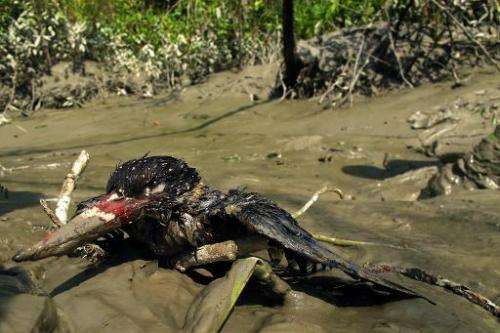UN sees 'limited' impact of Bangladesh's Sundarbans oil spill

United Nations experts said Wednesday they found "limited immediate impact" on the ecosystem of the world's largest mangrove forest in Bangladesh after a major oil spill early in December.
Local forestry officials raised the alarm when hundreds of thousands of litres of furnace oil were spilt into the forest's vast network of rivers and canals after a tanker sank following a collision with another cargo vessel.
They warned of a "catastrophic" impact from the spill, fearing harm to rare Irrawaddy and Ganges dolphins and to endangered species including Bengal tigers.
But a UN team sent last week to assess the damage ruled out any major fallout from the spill, saying the damage to the 10,000 square kilometre (3,850 square mile) wildlife sanctuary was not as bad as feared.
"There seems to be limited immediate environmental impact to the mangrove and aquatic ecosystems," said Emilia Wahlstrom, the leader of the 25-member UN team, as she revealed a summary of its findings.
"The main shorelines—40 kilometres (25 miles) up and downstream—of the site show varying degree of pollution. (But) we could not observe any visible impact on the mangrove forest floor," she added.
She said timely "tides" in the rivers "actually minimised the penetration of oil into the ecosystem. Much of the oil has been washed out along the Poshur and Shela rivers," she added.
Wahlstrom praised the local communities' manual clean-up, in which hundreds of villagers scooped up oil using sponges, pots and pans.
The team saw some impact of the spillage on the mangrove seedlings but also observed new growth already, she said.
Bangladesh's forest department said two rare otters and several birds died in the spill, while the carcass of an Irrawaddy dolphin was found several days after the accident.
But Wahlstrom said the damage was not significant.
"When it comes to wildlife, we see limited mortality and we find some visible oiling and again, limited," she said adding local villagers mopped up some 20 percent of an estimated 350,000 litres of oil which were spilt.
However she said the accident was "a wake-up call" for the government and recommended a ban on the movement of vessels through the Sundarbans, which is a UNESCO-declared World Heritage Site.
© 2014 AFP





















